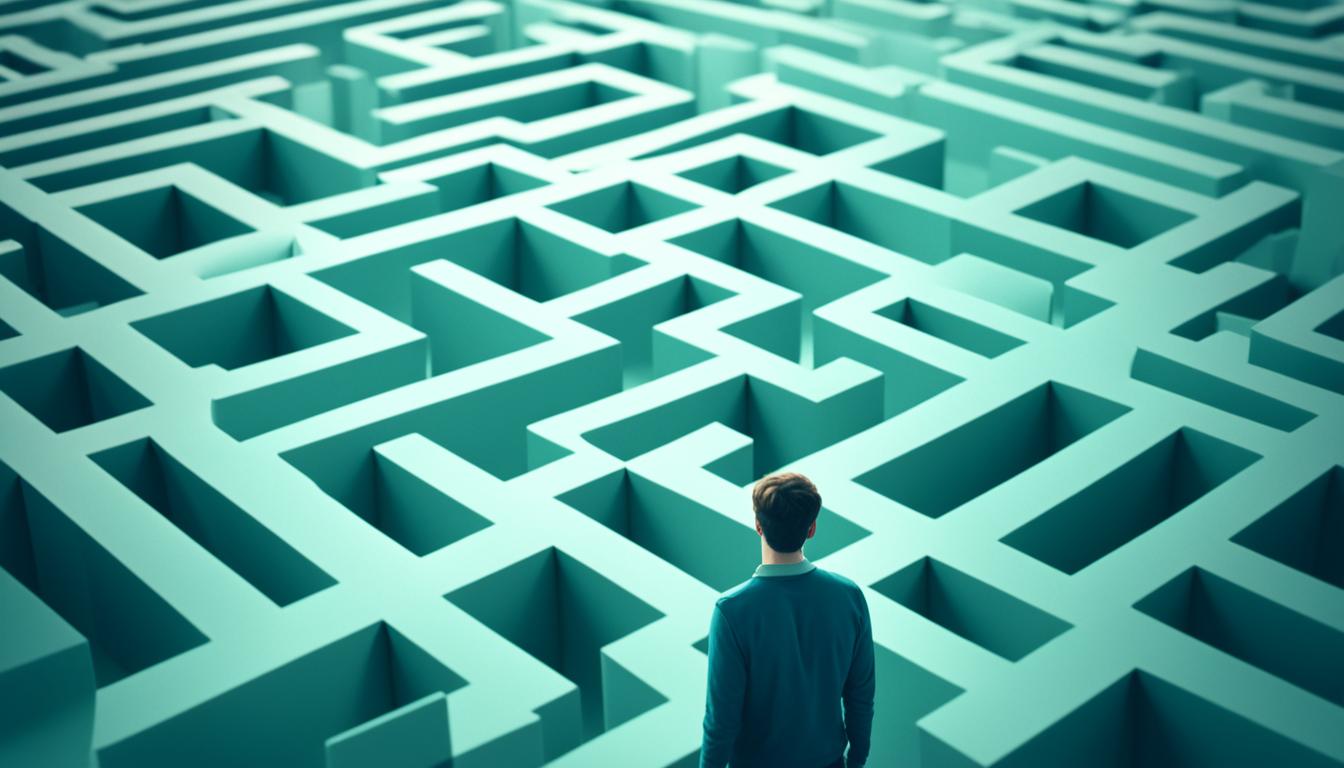Feeling lost and uncertain, not knowing what to do can weigh heavily on your mind. It’s a natural part of life to experience confusion and feel overwhelmed by the decisions ahead. But amidst the chaos, there is a pathway to clarity. Buddhism teaches us that navigating uncertainty is possible, and even in the face of confusion, you can find inner harmony and make informed choices.
Key Takeaways:
- Slowing down and creating space for contemplation aids in decision making.
- Mindfulness and observing thoughts without judgment helps in gaining mental clarity.
- Challenge limiting beliefs and trust yourself to overcome confusion.
- Seek professional guidance when needed, from life coaches or therapists.
- Remember that finding clarity is a journey and takes time.
The Importance of Slowing Down for Mental Clarity
When you find yourself feeling confused and unsure about what to do, it’s crucial to take a step back and slow down. In our fast-paced world, we often feel rushed and pressured to make quick decisions. However, rushing through the decision-making process can lead to hasty choices and regret.
By consciously slowing down, you create space for contemplation. This allows you to reflect on your options, weigh the pros and cons, and gain a deeper understanding of your own thoughts and emotions. Slowing down provides a much-needed pause to sort through the mental chaos and make more thoughtful decisions.

Contemplation is a powerful tool for achieving mental clarity. It allows you to examine different perspectives, explore your values, and consider the long-term consequences of your choices. By delving deeper into your thoughts and emotions, you uncover insights and unearth hidden desires that may have been overshadowed by external noise and expectations.
Slowing down and contemplating your decision-making process also helps you tap into your intuition. When you give yourself the time and space to connect with your innermost self, you can access a wellspring of wisdom and guidance. Trusting your intuition can lead to decisions that align with your authentic values and bring you greater fulfillment.
The Benefits of Slowing Down:
- Enhanced self-awareness: Slowing down allows you to tune in to your thoughts, feelings, and sensations, enabling a deeper understanding of yourself.
- Improved focus: By consciously slowing down, you shift your attention away from distractions and become more present in the moment.
- Reduced stress: Taking the time to slow down and contemplate helps alleviate the pressure and overwhelm that often accompany decision-making processes.
- Better decision-making: Slowing down allows you to consider all relevant factors and make more informed choices that align with your values.
Remember, slowing down is not a sign of indecisiveness or weakness; it is an act of self-care and mindfulness. By nurturing yourself with moments of contemplation, you empower yourself to make decisions that are in harmony with your true self.
| Slowing Down for Mental Clarity | Contemplation Benefits |
|---|---|
| Enhanced self-awareness | Improved focus |
| Reduced stress | Better decision-making |
Observing Thoughts to Achieve Mental Clarity
Are you feeling overwhelmed and confused, unsure of what steps to take in your life? Practicing mindfulness and observing your thoughts without judgment can be a powerful tool in gaining mental clarity and finding your path forward.
Mindfulness is the practice of being fully present and aware of the present moment. By cultivating mindfulness, you can create a space of self-awareness where you can observe your thoughts objectively. This allows you to gain a deeper understanding of your mental turbulence and identify patterns that may be contributing to your confusion.
When you distance yourself from your thoughts, you can see them more clearly. It’s like stepping back and observing a river from the bank instead of being caught up in the turbulent flow. By cultivating this self-awareness, you can uncover the underlying causes of your confusion and address them directly.
Here’s a simple mindfulness exercise you can try:
- Find a quiet and comfortable space to sit.
- Close your eyes and take a few deep breaths to center yourself.
- As thoughts arise, acknowledge them without judgment and let them go.
- Observe the thoughts as they come and go, without getting swept away by them.
Through regular practice, you’ll become more skilled in observing your thoughts and gaining mental clarity. You’ll begin to notice the thoughts that bring you joy and inspiration, as well as those that hold you back and contribute to your confusion.
Remember, observing your thoughts is not about controlling or suppressing them, but rather cultivating an attitude of curiosity and nonjudgment. This practice allows you to develop a deeper understanding of yourself and make decisions from a place of clarity and self-awareness.

By integrating mindfulness and observing thoughts into your daily life, you can gain mental clarity and navigate the uncertainty with confidence. Take some time each day to be present, observe your thoughts, and cultivate self-awareness. The clarity you seek is within reach.
Trusting Yourself and Challenging Limiting Beliefs
When it comes to finding clarity in life, self-trust and challenging limiting beliefs are crucial. Often, our confusion stems from the stories we tell ourselves – stories that limit our potential and hold us back from taking the necessary steps to move forward. But you have the power to break free from these self-imposed limitations and tap into your true potential.
Take a moment to reflect on the beliefs that may be boxing you in. Are there thoughts like “I’m not smart enough” or “I don’t have what it takes” that repeatedly hold you back? These limiting stories may have become ingrained in your mind over time, but they don’t define you. It’s time to challenge them.
Start by recognizing that these beliefs are just stories – narratives that can be rewritten. Question their validity. Ask yourself, “Is there evidence to support these beliefs? Are they based on facts or just fears?” By challenging these limiting stories, you open yourself up to new possibilities and opportunities.
Replace those limiting beliefs with empowering ones. Affirmations like “I am capable of anything I set my mind to” or “I trust myself to make confident decisions” can be powerful tools in rewiring your thought patterns. Embrace the belief that you have the wisdom and strength within you to navigate uncertainty and make informed choices.
Trusting yourself is not always easy, especially when faced with the unknown. But remember, self-trust is a journey – a continuous process of growth and self-discovery. It requires patience, self-compassion, and a willingness to challenge the stories that no longer serve you.
The Power of Self-Trust
When you trust yourself, you open the door to endless possibilities. Your self-trust acts as a guiding compass, helping you navigate through moments of uncertainty. It gives you the confidence to explore new paths, try new things, and take calculated risks. By trusting yourself, you become the author of your own story, breaking free from the limitations that once held you captive.
Self-trust is not a destination; it’s an ongoing practice. Cultivate it by honoring your intuition, listening to your inner voice, and making decisions aligned with your true desires and values. Trust that you have the wisdom and resilience to overcome any obstacles that may come your way.

Seeking Professional Guidance for Clarity
Sometimes, finding clarity on our own can be challenging. In these situations, seeking professional guidance can be incredibly beneficial. A life coach or therapist can provide the support and expertise needed to navigate through confusion and gain the clarity you seek.
Working with a life coach or therapist offers a structured and safe environment for you to explore your thoughts and emotions. Through thought-provoking questions and practical tools, they can help you uncover underlying patterns, identify barriers, and discover new perspectives.
With the guidance of a professional, you can gain valuable insights into your desires, strengths, and values. They can assist you in setting meaningful goals and developing a plan of action to move forward with confidence.
Here’s an inspiring quote from Tony Robbins: “A real decision is measured by the fact that you’ve taken a new action. If there’s no action, you haven’t truly decided.”
Benefits of Seeking Professional Help:
- Support from experienced professionals
- Thought-provoking questions to stimulate self-reflection
- Practical tools and techniques for gaining clarity
- A safe and nonjudgmental space to explore thoughts and emotions
- Guidance in setting meaningful goals and creating a plan of action
When you’re feeling overwhelmed and uncertain about what to do, don’t hesitate to reach out for professional help. Embrace the opportunity to gain valuable insights, enhance self-awareness, and make informed decisions that will lead you to a clearer and more fulfilling path.
Remember, seeking professional guidance is a sign of strength and a commitment to your personal growth.

Conclusion
Finding clarity when you don’t know what to do can feel like an overwhelming task, but it is entirely possible with the right techniques and practices. By taking the time to slow down and create space for contemplation, you can gain mental clarity and make more informed decisions. Embracing mindfulness and observing your thoughts without judgment can also help you understand and address the underlying causes of confusion.
Challenging your limiting beliefs and trusting yourself are crucial in overcoming confusion. Often, our self-imposed limitations hold us back from finding clarity. By questioning these beliefs and trusting your abilities, you can tap into your true desires and aspirations. Seek professional guidance when needed, as a life coach or therapist can provide valuable support and tools to help you navigate uncertainty.
Remember, finding clarity is a journey that may take time. Through self-reflection, self-care, and taking action, you can overcome confusion and live a more purposeful life. Trust in yourself and the process, and soon you will find the clarity you seek. Embrace the challenges as opportunities for growth and persevere in your quest for finding clarity, overcoming confusion, and making confident decisions.
FAQ
How can I find clarity when I don’t know what to do?
Feeling lost and uncertain about what to do is a common experience. To find clarity, try slowing down, reflecting on your options, and gaining a deeper understanding of your thoughts and emotions. Mindfulness, self-reflection, and contemplation can help you navigate uncertainty and make informed decisions.
Why is slowing down important for mental clarity?
Slowing down allows you to create space for contemplation and reflection. By taking the time to weigh the pros and cons and understand your own thoughts and emotions, you can sort through mental chaos and make more thoughtful decisions.
How can observing my thoughts help me achieve mental clarity?
Practicing mindfulness and observing your thoughts without judgment can help you gain mental clarity. By distancing yourself from your thoughts, you can better understand your mental turbulence and identify repeated thought patterns that may be causing confusion.
How can I trust myself and challenge limiting beliefs?
One of the keys to finding clarity is to trust yourself and challenge the limiting beliefs that hold you back. Recognize and question the stories you tell yourself about what you can and cannot do. This can help you untether from self-imposed limitations and tap into your true desires and aspirations.
Should I seek professional guidance when I don’t know what to do?
Sometimes, finding clarity on your own can be challenging. Seeking professional guidance, such as working with a life coach or therapist, can be incredibly beneficial. They can provide support, ask thought-provoking questions, and offer practical tools to help you gain clarity and make informed decisions.
What are some strategies for finding clarity and making decisions?
Finding clarity when you don’t know what to do is possible through various techniques and practices. By slowing down, observing your thoughts, challenging limiting beliefs, and seeking guidance, you can navigate uncertainty and make decisions with confidence. Trust in yourself and the process, and soon you will find the clarity you seek.

